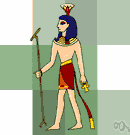Egyptian
Also found in: Thesaurus, Idioms, Encyclopedia, Wikipedia.
Related to Egyptian: Egyptian architecture, Egyptian religion
E·gyp·tian
(ĭ-jĭp′shən)n.
1.
a. A native or inhabitant of Egypt.
b. A person of Egyptian ancestry.
2. The now extinct Afro-Asiatic language of the ancient Egyptians.
adj.
1. Of or relating to Egypt or its people or culture.
2. Of or relating to the language of the ancient Egyptians.
American Heritage® Dictionary of the English Language, Fifth Edition. Copyright © 2016 by Houghton Mifflin Harcourt Publishing Company. Published by Houghton Mifflin Harcourt Publishing Company. All rights reserved.
Egyptian
(ɪˈdʒɪpʃən)adj
1. (Peoples) of, relating to, or characteristic of Egypt, its inhabitants, or their dialect of Arabic
2. (Languages) of, relating to, or characteristic of Egypt, its inhabitants, or their dialect of Arabic
3. (Placename) of, relating to, or characteristic of Egypt, its inhabitants, or their dialect of Arabic
4. (Peoples) of, relating to, or characteristic of the ancient Egyptians, their language, or culture
5. (Languages) of, relating to, or characteristic of the ancient Egyptians, their language, or culture
6. (Historical Terms) of, relating to, or characteristic of the ancient Egyptians, their language, or culture
7. (Printing, Lithography & Bookbinding) (of type) having square slab serifs
8. (Peoples) archaic of or relating to the Gypsies
n
9. (Peoples) a native or inhabitant of Egypt
10. (Peoples) a member of an indigenous non-Semitic people who established an advanced civilization in Egypt that flourished from the late fourth millennium bc
11. (Historical Terms) a member of an indigenous non-Semitic people who established an advanced civilization in Egypt that flourished from the late fourth millennium bc
12. (Languages) the extinct language of the ancient Egyptians, belonging to the Afro-Asiatic family of languages. It is recorded in hieroglyphic inscriptions, the earliest of which date from before 3000 bc. It was extinct by the fourth century ad. See also Coptic
13. (Historical Terms) the extinct language of the ancient Egyptians, belonging to the Afro-Asiatic family of languages. It is recorded in hieroglyphic inscriptions, the earliest of which date from before 3000 bc. It was extinct by the fourth century ad. See also Coptic
14. (Printing, Lithography & Bookbinding) a large size of drawing paper
15. (Peoples) an archaic name for a Gypsy
Collins English Dictionary – Complete and Unabridged, 12th Edition 2014 © HarperCollins Publishers 1991, 1994, 1998, 2000, 2003, 2006, 2007, 2009, 2011, 2014
E•gyp•tian
(ɪˈdʒɪp ʃən)n.
1. a native or inhabitant of Egypt.
2. the extinct Afroasiatic language of Egypt under the Pharaohs.
adj. 3. of or pertaining to ancient or modern Egypt, its people, or their language.
[1350–1400]
Random House Kernerman Webster's College Dictionary, © 2010 K Dictionaries Ltd. Copyright 2005, 1997, 1991 by Random House, Inc. All rights reserved.
ThesaurusAntonymsRelated WordsSynonymsLegend:
Switch to new thesaurus
| Noun | 1. |  Egyptian - a native or inhabitant of Egypt Egyptian - a native or inhabitant of Egypt Arab Republic of Egypt, Egypt, United Arab Republic - a republic in northeastern Africa known as the United Arab Republic until 1971; site of an ancient civilization that flourished from 2600 to 30 BC African - a native or inhabitant of Africa Copt - an Egyptian descended from the ancient Egyptians Theban - an Egyptian inhabitant of ancient Thebes Cairene - a native or inhabitant of Cairo Nubian - a native or inhabitant of Nubia; "Nubians now form an ethnic minority in Egypt" |
| 2. | Egyptian - the ancient and now extinct language of Egypt under the Pharaohs; written records date back to 3000 BC Afrasian, Afrasian language, Afroasiatic, Afro-Asiatic, Afroasiatic language, Hamito-Semitic - a large family of related languages spoken both in Asia and Africa Coptic - the liturgical language of the Coptic Church used in Egypt and Ethiopia; written in the Greek alphabet | |
| Adj. | 1. | Egyptian - of or relating to or characteristic of Egypt or its people or their language |
Based on WordNet 3.0, Farlex clipart collection. © 2003-2012 Princeton University, Farlex Inc.
Translations
مصريمِصْرِيّ
Egypťanegyptský
egypteregyptisk
egyptiläinen
egipatskiEgipćaninEgipćankaegipatski jezik
エジプトのエジプト人
이집트 사람이집트의
EgipcjaninegipskiEgipcjanka
EgypťanEgypťanka
egyptieregyptiskegyptiska
เกี่ยวกับประเทศอียิปต์ชาวอียิปต์
người Ai Cậpthuộc nước/người/tiếng Ai Cập
Collins Spanish Dictionary - Complete and Unabridged 8th Edition 2005 © William Collins Sons & Co. Ltd. 1971, 1988 © HarperCollins Publishers 1992, 1993, 1996, 1997, 2000, 2003, 2005
Collins English/French Electronic Resource. © HarperCollins Publishers 2005
Collins German Dictionary – Complete and Unabridged 7th Edition 2005. © William Collins Sons & Co. Ltd. 1980 © HarperCollins Publishers 1991, 1997, 1999, 2004, 2005, 2007
Egyptian
[ɪˈdʒɪpʃ/ən]1. adj → egiziano/a, egizio/a
Collins Italian Dictionary 1st Edition © HarperCollins Publishers 1995
Egyptian
→ مِصْرِيّ Egypťan, egyptský egypter, egyptisk Ägypter, ägyptisch αιγυπτιακός, Αιγύπτιος egipcio egyptiläinen Égyptien egipatski, Egipćanin egiziano エジプトの, エジプト人 이집트 사람, 이집트의 Egyptenaar, Egyptisch egypter, egyptisk Egipcjanin, egipski egípcio египетский, египтянин egyptier, egyptisk เกี่ยวกับประเทศอียิปต์, ชาวอียิปต์ Mısır, Mısırlı người Ai Cập, thuộc nước/người/tiếng Ai Cập 埃及人, 埃及的Multilingual Translator © HarperCollins Publishers 2009